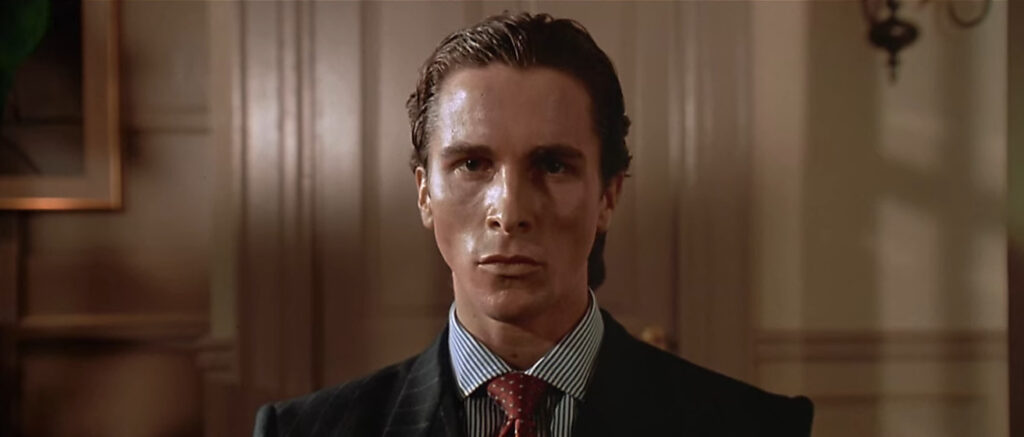Directed by Mary Harron, written by Harron and Guinevere Turner from the novel by Bret Easton Ellis
I’m going to pick 13 movies. They may be an influence on my writing, on my filmmaking, or on my thinking. They may just be movies I like. There may be more than 13.
Here’s a hot take. If Cries and Whispers is a horror movie, then American Psycho is a Christian movie. Angel Studios or PureFlix should do a theatrical re-release and roadshow it to churches, with Rick Warren writing a companion devotional with chapter headings like “What does your business card look like?” Alas, it won’t happen—for all the same reasons Blumhouse won’t be remaking Bergman. Audiences expect certain signifiers in their genres. If they don’t get them, they won’t accept the signifieds.
The signifiers in American Psycho are axe murders, chainsaw dismemberments, three-way sex acts, torture, and mountains of narcissism. Tailored shirts, business cards, and six-pack abs take on existential significance for Patrick Bateman, the titular psycho. He has no regard for anything human, not even himself. There are glimpses of self-preservation, as when he runs from police and tries to outwit a private detective. But in the end, Bateman is, as advertised, a monster. He gets no redemption, and the character arc Harron and her co-writers deftly tease turns out to be smoke and mirrors.
Why make such a nihilistic art piece? Why make any meditation on detachment and anomie? Look past the veneer of blood and sexual exploitation and the film becomes a comedy, a satire—but not the kind of satire it purports to be.
According to the filmmakers and book author Bret Easton Ellis, Patrick Bateman embodies the empty materialism of the 1980s. Implicated here are all the usual suspects: Wall Street, white male privilege, and Ronald Reagan. But materialism has two meanings—on the one hand an obsession with material wealth; on the other, the rejection of anything transcendent or spiritual—souls, morality, and God are not material, so they do not exist. Bateman’s world is materialistic in both senses, and that interpretation layers new meaning on American Psycho.
Bateman’s obsession with his body, status, and wealth are the cover for his lack of conscience. He does experience what appears to be an “altar call moment,” causing him to openly hallucinate and confess his sins. But there are no consequences from this act. There is also no reason for this crisis, no inciting event. We have cause to believe this is a cyclical occurrence. Bateman will get no release. His flat voiceover while sitting beneath a sign marked THIS IS NOT AN EXIT says it all:
My pain is constant and sharp, and I do not hope for a better world for anyone. In fact, I want my pain to be inflicted on others. I want no one to escape. But even after admitting this, there is no catharsis; my punishment continues to elude me, and I gain no deeper knowledge of myself. No new knowledge can be extracted from my telling. This confession has meant nothing.
American Psycho not only indicts the materialism of Gordon Gekko, but also the materialism of Diderot and Marx. It satirizes the 1980s even as it satirizes the very notion of the ubermensch. Bateman might say he’s such a man, but he is not. Nor is he the devil. Rather, he is one of millions of dead souls, like the characters in Sartre’s No Exit consigned for all eternity to Hell. To be sure, this is the Hell of Christianity, a place of constant suffering and hopelessness. Bateman may be beyond God and beyond morality, but he has not crossed over to Nietzsche’s world of new creation—instead there is only weeping and gnashing of teeth. Here one can act with abandon, but he will never be satisfied nor will he be reviled. On the temporal Earth, he would be a headline. In his world, he is not even special.
There is an idea of a Patrick Bateman; some kind of abstraction. But there is no real me: only an entity, something illusory. And though I can hide my cold gaze, and you can shake my hand and feel flesh gripping yours and maybe you can even sense our lifestyles are probably comparable… I simply am not there.
This bit of voiceover occurs right after Bateman blandly describes his morning skin care routine, the banality giving way to a sudden admission of sociopathic detachment, heard over the image of Bateman peeling off a facemask the way a snake sheds his skin. That’s the way American Psycho rolls, yanking you between celebrations of retro culture, genre conventions, and gruesome death. (I realize I described this movie as a nihilistic art piece. It is that, but be warned—if you don’t mind depictions of murder and misogyny, this is actually a very entertaining film.)
I read this movie almost got made with Leonardo DiCaprio starring and Oliver Stone directing. I respect both artists’ work, but Harron, Turner, and star Christian Bale I think were the exact right people for the job. The pre-Batman Bale at this point was trying to break into adult roles (his previous role, by the way, was playing Jesus). Harron was an indie director with one feature to her name. They had everything to risk and everything to lose. On such a razor’s edge teeters the most powerful art. After watching what you think is a slasher movie, an arthouse movie, a crime movie, a psychological thriller, and even a sort of rom-com, you realize this familiar world is a horrific cul-de-sac. One where nothing you do matters. No matter how many people you kill, you will never get that reservation at Dorsia. There is only the waitlist.

